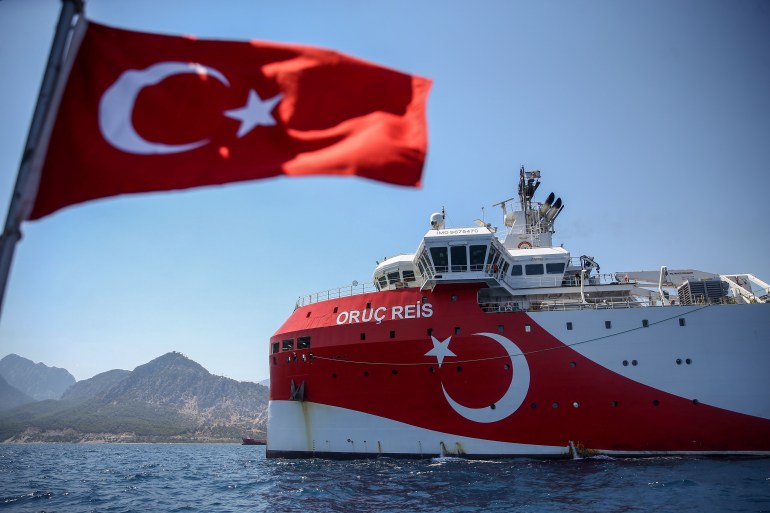The eastern Mediterranean has witnessed a new military escalation that heralds a confrontation between the rival regional powers, with Turkey standing alone against Greece, Egypt, Israel and France.
And Turkish media reported that French fighters flew over the exclusive economic zone claimed by Greece, while the Turkish ship "Aruj President" continues its search work in the eastern Mediterranean.
This accelerated escalation raises questions related to what Turkey relies on in its confrontation with several countries in the region, and is it being lured into a crisis that is draining it to occupy it from other files in Syria and Libya?
Harassment and intimidation
The French Ministry of Defense stated that it had temporarily deployed two Rafale fighters and two military ships in the eastern Mediterranean, against the backdrop of escalating tension between Greece and Turkey due to the dispute over gas exploration.
For its part, the Turkish Ministry of Defense confirmed, in a tweet yesterday evening, on its Twitter account, that its naval forces continue to protect the exploration vessel "Aruj Rais" in the Mediterranean waters.
French President Emmanuel Macron announced the strengthening of his country's military presence in the eastern Mediterranean, and stressed that the situation in the eastern Mediterranean is a cause for concern, and that the unilateral Turkish exploration work raises tensions, he said.
On the other hand, Turkish President Recep Tayyip Erdogan confirmed yesterday that his country had responded to all attempts to attack it. "We provided our response to these attacks in the language they understand, through the operations we carried out in northern Iraq, Syria, Libya and the eastern Mediterranean," he said.
Erdogan added, "We also responded, and we told them," Beware of the attack on our ship, the Aruj President. If you do that, you will pay a heavy price, and here they receive our first response. "
Turkish media reported that a Greek frigate called "Lemonos" tried to harass "Aruj President," but the Turkish Navy intervened and forced the frigate to move away from the area after it was damaged.
And on Wednesday, Turkish Minister of Energy and Natural Resources Fatih Donmez announced the start of the ship "Oruj President" two-dimensional seismic survey work in the eastern Mediterranean.
The Greek Prime Minister warned Wednesday that the situation in the eastern Mediterranean could slide towards a military accident due to the presence of large military forces in a limited place, pointing out that Greece is not alone in this confrontation with Turkey.
Turkey and Greece, both members of NATO, differ strongly over their overlapping claims for sovereignty over energy resources in the region, and the escalation of tension since Ankara began drilling operations in a disputed area in the Mediterranean on Monday.
Turkey challenges
In this context, the leader of the ruling Justice and Development Party, Rasul Tosun, stated that Turkey is based on international legitimacy in the eastern Mediterranean, and is defending its rights and the rights of the Turkish Cypriots after it signed an agreement legally demarcating the maritime borders with Libya and registered it with the United Nations.
Tosson told Al-Jazeera Net, "Ankara is determined to defend its rights and will continue its work in the eastern Mediterranean, defying and watching the provocations of countries that act in contravention of international law, and we also have the plan and the ability to confront those countries in the eastern Mediterranean if they initiate any military action against us."
He pointed out that Turkey wants to address the issue peacefully, noting in the context Erdogan's call on Wednesday for a solution that satisfies all concerned parties.
He said that while Ankara was preparing for diplomatic talks with Athens under the mediation of German Chancellor Angela Merkel, then Greece had signed an "illegal" agreement with Egypt, forcing Turkey to return to the exploration process.
The former MP Toson added that the issue for France, Greece and Egypt is not drilling for hydrocarbons in the eastern Mediterranean, but rather has other dimensions represented in pressuring Turkey to concede in the files of Libya, Syria and Iraq, explaining that Israel is using the opportunity in its favor.
He added that Turkey is aware of all the dimensions, and that it has developed plans to deal with all scenarios, and considered that Turkey trusts its government and its army and will not submit to pressure, and what he described as the plots of regional countries working against it will fail.
Between the military and the diplomat
, for his part, the Turkish researcher in international relations, Taha Odehoglu, believes that Turkey, through its confrontation with many regional countries in the region, seeks to have a share in the gas wealth and other energy resources in the Mediterranean by re-demarcating the maritime borders in a more equitable way.
Odehoglu said to Al-Jazeera Net, "The Turkish vision is based on the necessity of resolving the Cyprus issue first, and then distributing the energy wealth. Therefore, it strongly rejected the recently signed maritime agreement between Egypt and Greece."
He added that Turkish diplomacy has been active in recent days despite the French escalation and Paris’s attempt to mobilize the European Union, pointing to the contact that took place yesterday between Turkish President Recep Tayyip Erdogan and European Council President Charles Michel, during which they discussed developments in the eastern Mediterranean, as well as a meeting with the Turkish foreign minister. Mevlut Cavusoglu with the European Union's High Representative for Foreign and Security Policy Josep Borrell.
The Turkish researcher explained that Ankara sends messages through the military escalation on the one hand and the diplomatic movement on the other hand, to emphasize that a large country like Turkey cannot be excluded from the equation, and that dialogue is the only solution to this crisis.
Last November, Turkey signed two memoranda of understanding with the Government of National Accord in Libya on security and military cooperation and defining areas of maritime influence in the Mediterranean, which angered Egypt, Greece and Cyprus (Greek).

